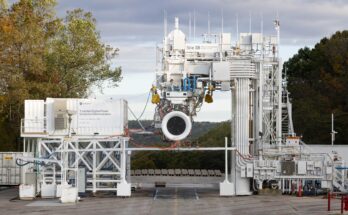by J. Kasper Oestergaard, European Correspondent.

Airbus and Boeing took the headlines at the 2017 Dubai Airshow with a slew of orders and commitments. In the weeks leading up to the air show, the high point was expected to be a new Emirates order for 36 A380 superjumbos, but instead the newsflow out of Dubai was dominated by massive commitments for both manufacturers’ new families of narrowbody jets. As the doors closed on Thursday of last week, total orders amounted to nearly $114 billion at list prices. According to the organizers, trade visitors were up 20 percent over the 2015 event, and almost 80,000 people visited the show during its five-day run. For Airbus and Boeing, the final score in Dubai was 510 and 296 orders and commitments, respectively.
Despite long and hard negotiations, an A380 deal never materialized. Emirates requested a guarantee from Airbus that it would keep the A380 in production for another decade and commit to further developing the platform. Emirates also asked Airbus to buy back some its oldest jets. As hopes for a deal fizzled, a major blow was dealt to Airbus when Emirates committed to buying 40 787-10 Dreamliners. Emirates chairman Sheik Ahmed bin Saeed Al Maktoum said the carrier had chosen the Dreamliner after comparing it with the Airbus A350 XWB. This surely was not a comment that Airbus appreciated after having competed fiercely to win back Emirates’ endorsement after the latter canceled an order for 70 A350s in June 2014.
On November 15 – day four of the air show – Airbus and Indigo Partners signed a Memorandum of Understanding (MoU) that constitutes a commitment but not a firm order for the purchase of 430 A320neo family aircraft, with deliveries to begin in 2021. The aircraft will be allocated among Indigo’s portfolio of four low-cost airlines: Frontier Airlines (U.S.), JetSMART (Chile), Volaris (Mexico), and Wizz Air (Hungary). The commitment comprises 273 A320neos and 157 A321neos worth $49.5 billion at list prices (the true value is normally 50% off list prices minus volume discounts => a likely true value of $23 billion). Of the 430 jets, Wizz Air is expected to receive 72 A320neos and 74 A321neos, followed by Frontier (100 A320neos / 34 A321neos), Volaris (46 A320neos / 34 A321neos), and JetSMART (56 A320neos / 14 A321neos). Airlines in the Indigo Partners family have previously placed orders for 427 A320 family aircraft.
On top of the Indigo commitment, Dublin-based CDB Aviation Lease Finance (CDB Aviation) placed a firm order for 90 A320neo family jets. The order replaces an original purchase agreement signed in 2014 for 45 A320neo family aircraft, and firms up the MoU announced at the 2017 Paris Air Show for an additional 30 A320neo and 15 A321neo aircraft. The CDB Aviation order comes at a critical time for Airbus, with only 288 net new orders booked in 2017 as of October 31. Just days before the Dubai Airshow, Boeing had finalized an order with CDB for 52 737 MAXs and eight Dreamliners.
On November 15, Boeing and flydubai signed an MoU for 175 737 MAX narrowbody jets, with purchase rights for 50 additional aircraft. According to Boeing, more than 50 of the 175 jets will be 737 MAX 10s; the MAX 10 is the newest and largest member of the 737 MAX family. If finalized, the deal will be the largest single-aisle jet purchase ever by a Middle East airline.
While the commercial side of the industry received the most attention in Dubai, a number of key defense deals were signed. On the first day of the air show, Lockheed Martin signed a $1.6 billion contract with the United Arab Emirates for upgrades to the nation’s 80 F-16 Block 60 fighter jets. Lockheed Martin declined to provide details about the nature of the modifications. UAE awarded yet another aircraft modification contract on day three, this time to Dassault and Thales for the upgrade of Mirage 2000 fighter jets. Worth approximately $350 million, the agreement is regarded by some as a precursor to a UAE procurement of Dassault Rafales. Although the event is mainly an air show, Raytheon picked up an armaments award in Dubai. Under a $684 million contract, the company will supply GBU-10 and GBU-12 Paveway laser-guided bomb kits to the UAE. The country is a major recipient of U.S. weapons and ammunition and has been a combatant in the Yemen war for more than two years as part of the Saudi Arabian-led coalition. On day four of the air show, the UAE announced a $250 million deal for five Airbus C-295 military transport aircraft. The UAE is a new customer for the C-295 program, which has received orders from more than 20 military customers to date.
While the much-awaited A380 deal did not materialize in Dubai, Airbus remains hopeful that an agreement can be reached at a later date. Also, it will be interesting to see if Boeing and Airbus will be able to firm up some of the large narrowbody agreements before the year ends.
Please feel free to use this content with Forecast International and analyst attributions, along with a link to the article. Contact Ray Peterson at +1 (203) 426-0800 or via email at ray.peterson@forecast1.com for additional analysis.
 The Forecast International Civil Aircraft service covers all facets of the fixed-wing commercial and private aviation industry. It includes more than 70 detailed reports, complete with production forecasts on individual civil aircraft families. Four Market Segment Analyses provide in-depth examination of the markets for Large Commercial Jet Transports, Regional Aircraft, Business Jets, and General Aviation/Utility Aircraft. Included in the reports are production forecasts, a Forecast Rationale detailing the basis for the forecast, the aircraft’s price range and technical specifications, a program history, and recent developments.
The Forecast International Civil Aircraft service covers all facets of the fixed-wing commercial and private aviation industry. It includes more than 70 detailed reports, complete with production forecasts on individual civil aircraft families. Four Market Segment Analyses provide in-depth examination of the markets for Large Commercial Jet Transports, Regional Aircraft, Business Jets, and General Aviation/Utility Aircraft. Included in the reports are production forecasts, a Forecast Rationale detailing the basis for the forecast, the aircraft’s price range and technical specifications, a program history, and recent developments.
References:
http://www.arabianbusiness.com/industries/transport/383800-drama-in-the-desert-how-the-airbus-a380-deal-evaporated-in-dubai
http://boeing.mediaroom.com/Boeing-Wins-Landmark-Deals-Highlights-Broad-Portfolio-at-Dubai-Airshow
http://boeing.mediaroom.com/2017-11-15-Boeing-flydubai-Sign-Historic-Deal-for-225-737-MAX-Airplanes
http://finance.yahoo.com/news/dubai-wants-guarantee-a380-output-062934041.html
A military history enthusiast, Richard began his career at Forecast International as editor of the World Weapons Weekly newsletter. As the Internet became central to defense research, he helped design the company’s Forecast Intelligence Center and now coordinates the FI Market Recap newsletters for clients. He also manages two blogs: Defense & Security Monitor, which covers defense systems and international security issues, and Flight Plan, focused on commercial aviation and space systems.
For more than 30 years, Richard has authored Defense & Aerospace Companies, Volume I (North America) and Volume II (International), providing detailed data on major aerospace and defense contractors. He also edits the International Contractors service, a database tracking all companies involved in programs covered by the FI library. Richard currently serves as Manager of the Information Services Group (ISG), which develops outbound content for both Forecast International and Military Periscope.



